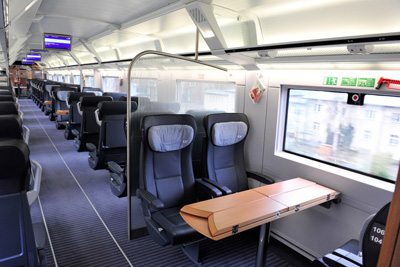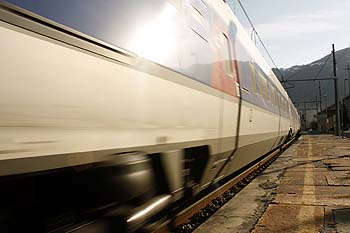If your train is cancelled or delayed, you are entitled to a refund and compenstation respectively, as well as being able to take the next available train to continue your journey.
Introduction
It's relatively rare that trains are cancelled. But if a train that you have tickets for is cancelled, you are eligible by law for a refund.
This guide will help you know what your rights are, and how to request a refund, to the best of our knowledge.
It'll certainly set you on the right path.
But please bear in mind that we at Snowcarbon are not experts on rail-passenger law. We are just trying to research and provide the best information we can. It is always advisable to check with your travel provider before booking tickets, rather than relying on what we say.
Your rail-passenger refund rights

The first thing that you should know is that if a train that you have bought tickets for is cancelled, you have the right to a monetary refund, not just a travel voucher.
You might at first be offered only a voucher by the train company, or ticket provider. But you are legally entitled to dirty cash / wedge / wonga / moola. Whatever you like to call it. Back into your bank account.
This is your statutory right under EU passenger law. The law states that no matter whom you booked with, if your train is cancelled you have a right to be reimbursed. The actual regulation is called: Regulation (EC) No 1371/2007 of the European Parliament and of the Council of 23 October 2007 on Rail Passengers’ Rights and Obligations (“PRR”).
And here’s a pertinent quote from the regulatory document:
‘The compensation of the ticket price shall be paid within one month after the submission of the request for compensation. The compensation may be paid in vouchers and/or other services if the terms are flexible (in particular regarding the validity period and destination). The compensation shall be paid in money at the request of the passenger.’
The regulation states:
Where it is reasonably to be expected that the delay in the arrival at the final destination under the transport contract will be more than 60 minutes, the passenger shall immediately have the choice between:
(a) reimbursement of the full cost of the ticket, under the conditions by which it was paid, for the part or parts of his or her journey not made and for the part or parts already made
if the journey is no longer serving any purpose in relation to the passenger’s original travel plan, together with, when relevant, a return service to the first point of departure at the
earliest opportunity. The payment of the reimbursement shall be made under the same conditions as the payment for compensation referred to in Article 17; or
(b) continuation or re-routing, under comparable transport conditions, to the final destination at the earliest opportunity; or
(c) continuation or re-routing, under comparable transport conditions, to the final destination at a later date at the passenger’s convenience.
So that's a refund if your train is cancelled, and the money paid back to you within a month of you submitting the refund request.
What to do if your train is cancelled
In the event that your train has been cancelled, you should normally receive an email from your ticket provider (whether that’s the train company directly, a ticketing website, rail-booking agent or a tour operator) informing you of the cancellation.
You should can then contact your ticket provider to either:
• Arrange to travel on alternative trains
• Accept a travel voucher
• Request a monetary refund
The actual ways to apply for and obtain your refund may vary, depending on which trains are cancelled, and who you booked your journey with. But your underlying passenger rights remain the same, and that's the important thing.
Cancelled trains within multi-leg journeys
Your journey to the Alps by train is going to involve more than one train each way. You might, for example, be travelling by Eurostar from London to Paris and then a TGV train from Paris to the Alps. But if one train is cancelled and your onward train isn't, it could still scupper the entire journey, in theory. So you might be wanting to get a refund on all the trains. The degree to which this is possible isn't entirely clear.
If you’ve booked the whole journey with one ticket provider, you should be able to go back to them and get the whole thing refunded. If you’ve booked your journey separately (for example, the Eurostar legs with Eurostar, and the TGV journeys with Trainline) then you’ll need to apply to each ticket provider to obtain the refunds for the trains that you booked with them.
We asked Trainline (an online ticket agency) what it considers to be a 'connecting train'. Trainline said:
“Connected” is a loosely used term or phrase when a traveller must catch a secondary or tertiary train, after their original service has departed its station or origin and arrived at its initial destination station. It does not matter how or when the bookings were made - it makes no difference to the refund scenarios."
So you should be able to get a refund for a connected train leg, even if you didn't book them together at the same time. But where possible, it's always better to do so, as the trains you book will count more as 'one journey'.
Delayed trains and missed connections

When making journeys of multiple legs, if one train is delayed it could cause you to miss your connection. What happens then? In almost every case, you are going to be allowed onto the next available train.
HOTNAT covers:
- TGV trains travelling within France and to Germany, Spain, Italy, and Belgium
- ICE trains in Germany
- Eurostar
- Thalys in France, Germany, Belgium, Luxembourg, and the Netherlands
- TGV Lyria (France to Switzerland)
If your train is delayed and you are worried that you’ll miss — or have missed — your connection:
- Ask the ticket inspector on your delayed train to mark your ticket to show that it is delayed. This isn’t essential, but worth doing where possible.
- When you arrive at the station where you are going to take your onward train, go to the ticket office (if there is time, before the next train) or directly to the train platform. Explain to staff that you have missed your connection because of a delayed train, and that you would like to travel on the next available train. They’ll be able to check that your train was delayed, or they’ll just believe you because it’s true.
- Once your onward journey is sorted, look up the amount of compensation that you may be due for your delayed train – see the section below, and apply for it.
Stations specifically covered by HOTNAT
Stations covered by HOTNAT, even if your train is not in the above list:
If the traveller’s connecting train is departing from one of the following stations, they are also covered by Railteam’s HOTNAT service, which means they do not need to do anything but take the next train with their existing ticket.
The Hop on The Next Available Train service is currently available for departures from these stations:
- Paris Gare du Nord
- Paris Gare de l’Est
- Paris Gare de Lyon
- Paris Montparnasse
- Lille Europe Station
- Lyon Part Dieu
- Strasbourg
- Brussels Midi-Zuid
- Frankfurt Main Station
- Cologne Main Station
- Offenburg
- Stuttgart
However, across the European rail network — i.e at any station — it is generally expected that if a late train causes you to miss your onward connection, you are entitled to get on the next available train.
Compensation for train delays
If your journey is delayed more than a certain number of minutes, you are eligible for compensation.
EU Rail Passengers’ Rights and Obligations (“PRR”) law states:
Without losing the right of transport, a passenger may request compensation for delays from the railway undertaking if he or she is facing a delay between the places of departure and destination stated on the ticket.
The minimum compensations for delays shall be as follows:
(a) 25 % of the ticket price for a delay of 60 to 119 minutes,
(b) 50 % of the ticket price for a delay of 120 minutes or more.
Compensation for delay shall be calculated in relation to the price which the passenger actually paid for the delayed service.
This compensation is in addition to the fact that if your delay causes you to miss a connection, you are able to ‘hop on the next available train’ (HOTNAT).
It is always worth getting a ticket inspector or station staff to stamp your ticket with the number of minutes that the train was delayed, to help with the any delay-compensation claim you might make.
Useful links and resources
Eurostar's website:
What happens if Eurostar cancels my train?
Can I cancel and get a refund online
Webpage and form for exchanges and refunds on Eurostar
Eurostar's compensation application page
Rail Europe's website:
How to claim compensation for a cancelled train
How to submit a refund or compansation claim to Eurostar
How to submit a refund or compensation claim to SNCF
Trainline's website:
Passenger Rights under the Rail Passenger Rights Regulation
Which.co.uk's consumer advice website:
Compensation for Eurostar delays and cancellations
Useful general advice about your travel rights


 Back
Back